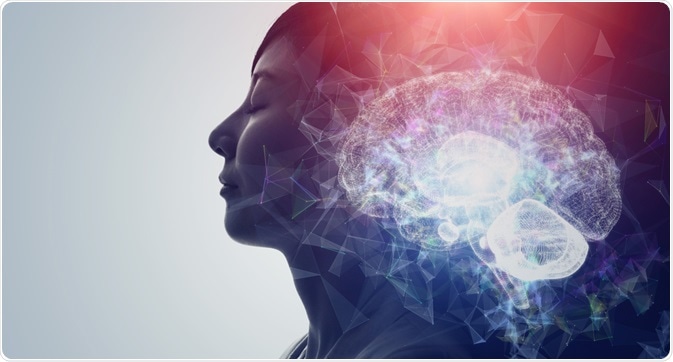The neuroscience of sleep refers to the effect of sleep on the brain and nervous system in the body. Sleep is essential for the human body to develop and function healthily and it is regulated by several different mechanisms and neurotransmitters in the central nervous system.

Image Credit: metamorworks / Shutterstock.com
What is sleep?
Sleep is a naturally recurring state that is marked by reduced or absent consciousness and sensory activity, as well as the inactivity of most voluntary muscles.
There are two main stages of sleep known as rapid eye movement (REM) and non-rapid eye movement sleep (NREM) or slow-wave sleep (SWS). During REM sleep, the brain activity is similar to that of an awake person, whereas NREM sleep is highlighted by periods of slow waves and synchronized neuron activity.
Neurological regulation of sleep
The timing of sleep is regulated by the circadian rhythm, which is the internal clock of the body that dictates the urge to sleep according to the surrounding environment and light cues.
The circadian rhythm is controlled by the suprachiasmatic nucleus (SCN) in the hypothalamus, which processes light signals from the optic nerve and triggers the release of certain neurotransmitters. The SCN monitors changes in body temperature, the production of cortisol hormone, as well as the release of melatonin, all of which have an effect on sleep.
Acetylcholine is an important neurotransmitter in the regulation of sleep, particularly within the pons and the basal forebrain of the brain, as it helps to increase cortical arousal. Other neurotransmitters involved in the regulation of sleep, include gamma aminobutyric acid (GABA), which promotes sleep, as well as norepinephrine, serotonin, histamine and orexin, which increase alertness and hinder sleep.
The Science of Sleep: Melatonin to Neural Pathways
Neurological function
Although sleep is considered to be an essential function, it is not entirely clear why it is required, beyond the prevention of sleep deprivation and related consequences. There are, however, several physiological processes that occur in the brain and central nervous system (CNS) during sleep that are important for bodily functions, although its exact role in these processes is still being uncovered.
During REM sleep, for example, the activity of the brain is similar to that of a person who is awake, suggesting that it is not a dormant period and has a specific function. It is during this stage of sleep that vivid dreaming is likely to occur, which is proposed to be a mechanism to replay and process mental stimuli in order to extract meaning and create memories.
It is currently believed by many sleep researchers that the process of sleep is required to systemize the debris in the brain that builds up while an individual is awake. In particular, beta-amyloid, which is a protein associated with Alzheimer’s disease, is believed to cause harm to the brain tissue and memory function over time. During sleep, channels in the brain allow the cerebrospinal fluid to flush beta-amyloid proteins and other debris out of the brain tissue, reducing the buildup of toxins and the likelihood of neurodegenerative disease.
It is probable that the purpose and function of sleep in the brain and CNS is much deeper than what we are currently aware of and, as sleep research continues to progress, we will continue to discover more about this field.
References
Further Reading
Last Updated: Jan 18, 2023